

Confront Corporate Power. Public Citizen Home Page. Activist Cash: Profiling activists, organizations & funding. David Brin: THE TRANSPARENT SOCIETY. Our society has one great knack above all others -- one that no other ever managed -- that of holding the mighty accountable.
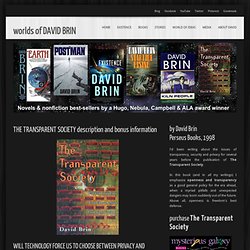
Although elites of all kinds enacted laws and customs to hold commonfolk accountable, never before have citizens been so empowered. And history shows that this didn't happen by blinding the mighty -- a futile endeavor that has never worked. It happened by insisting that everybody get to see. By citizens demanding the power to know. I go into this theme at many levels in both fiction and nonfiction. The Transparent Society: Will Technology Force Us to Choose Between Privacy and Freedom? The complete Table of Contents and a number of reviews, blurbs and commentary appear below, and Chapter One is also available to read on this website. PART I: A New World Chapter One: The Challenge of an Open Society Surveillance Technology: Its burgeoning seems unstoppable, but this may not mean the end of freedom or privacy. Radical transparency. Radical transparency is a phrase used across fields of governance, politics, software design and business to describe actions and approaches that radically increase the openness of organizational process and data.
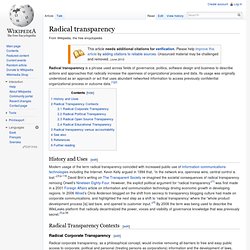
Its usage was originally understood as an approach or act that uses abundant networked information to access previously confidential organizational process or outcome data.[1][2]
Corporate social responsibility. The term "corporate social responsibility" became popular in the 1960s and has remained a term used indiscriminately by many to cover legal and moral responsibility more narrowly construed.
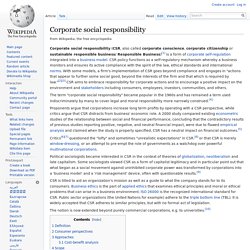
Proponents argue that corporations increase long term profits by operating with a CSR perspective, while critics argue that CSR distracts from business' economic role. A 2000 study compared existing econometric studies of the relationship between social and financial performance, concluding that the contradictory results of previous studies reporting positive, negative, and neutral financial impact, were due to flawed empirical analysis and claimed when the study is properly specified, CSR has a neutral impact on financial outcomes.[5] Critics[6][7] questioned the "lofty" and sometimes "unrealistic expectations" in CSR.[8] or that CSR is merely window-dressing, or an attempt to pre-empt the role of governments as a watchdog over powerful multinational corporations.
Definition[edit] Approaches[edit] Knowmore.org - Question Your Goods. Vote With Your Wallet. The radical transparency of DAVID BRIN. The Transparent Society: Will Technology Force Us to Choose Between Privacy and Freedom?
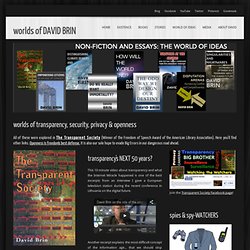
Was published in May 1998 by Perseus Press (formerly Addison Wesley). This large nonfiction work concerns threats to privacy and openness in the information age. It won the Obeler Freedom of Speech Award from the American Library Association and was a finalist for the McGannon Public Policy Prize, and is still in print. Our society has one great knack above all others -- one that no other ever managed -- that of holding the mighty accountable. Although elites of all kinds still have many advantages over commonfolk, never before have citizens been so empowered.
The infamous page 206 Yes, that is where -- in a creepy "Twilight zone" moment -- I seemed to predict the events of 9/11 in detail and then the following Patriot Act: "What might have happened if those bombers actually succeeded in toppling both towers of New York's World Trade Center, killing tens of thousands.
I DEFEND a TRANSPARENT SOCIETY. Global Witness. The 14 Characteristics of Fascism, by Lawrence Britt, Spring 2003. The F Scale: Final form.
Relations & Connections. The Transparent Society: Will Technology Force Us To Choose Between Privacy ... - David Brin - Google Books. Introducing the Cycle of Transparency. Government transparency is that rarest of political phenomena -- a great idea with support across the political spectrum and popularity among the public.
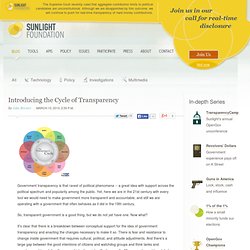
Yet, here we are in the 21st century with every tool we would need to make government more transparent and accountable, and still we are operating with a government that often behaves as it did in the 19th century. So, transparent government is a good thing, but we do not yet have one. Now what? It's clear that there is a breakdown between conceptual support for the idea of government transparency and enacting the changes necessary to make it so. There is fear and resistance to change inside government that requires cultural, political, and attitude adjustments. For many, the concept of transparency still simply feels too vague to get behind in a meaningful way. We've grappled with these challenges at Sunlight since our founding four years ago, and have been thinking about it with increased urgency over the last year in particular. NNDB: Tracking the entire world. Peter Eigen: How to expose the corrupt.
Corporate psychopathy... Corporations Watch... Consumer networks. Category:Consumer rights activists. Inequality watch. Center for Consumer Freedom. Transparency International - the global coalition against corruption.